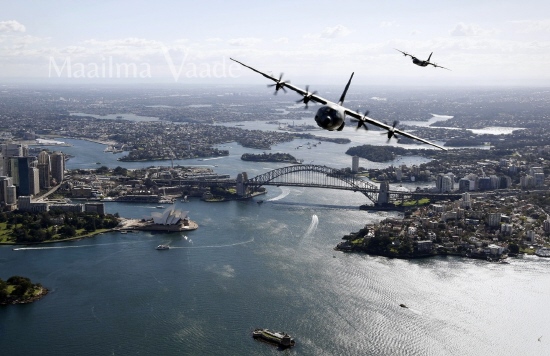Back on 19 January 2012, the 12th Secretary General of NATO appeared in Tallinn on business – not only did Anders Fogh Rasmussen publically pay tribute to Estonia for a unique possibility for him to talk to his “children and grandchildren in the United States and Denmark” via Skype, but, on a far more serious note, Anders Fogh Rasmussen stated that “NATO remains the world’s gold standard in security cooperation”.
As much as for any New Zealander, ‘cooperation’ means a great deal to me. The well-developed South Pacific archipelago and one of this planet’s oldest classic democracies, New Zealand is all about genuine and mutually beneficial interconnectedness with other nations. Therefore, I could not hold myself from not asking the Secretary General a simple question on how NATO is planning to enhance its cooperation with the organisation’s partners across the globe – more specifically, with the perceivably like-minded nations such as Australia, Japan, South Korea, and New Zealand. The question was finishing up with a not-so-well-hidden highly speculative suggestion regarding possible NATO membership for some of the aforementioned countries... In 2012, it did sound like political science fiction – no more, no less. The Rasmussen’s answer was, however, not so generic as one could have predicted it would be – the Secretary General underscored that, enlargement wise, NATO is concentrating on (thinking of) Europe only, but, regarding the elsewhere, the organisation is in real need to find appropriate methods to enhance cooperative mechanisms with its global partners. After I heard the answer, my immediate thought was that it would be nice to find out how those known as well as prospective partners really perceive NATO and what kind of a scope for partnership they have in mind when cooperating with the Alliance.
In the academic field of international relations, our thoughts, worries or predictions could literally lead to nowhere, but also could be materialised in no time. Two years is nothing for history, and the 2014 Quiet Crimean War made irreparable damage to the post-1945 international system. The subsequent Russian invasion to the Ukrainian Donbass, the actions of the so-called Islamic State, and the Nigerian contemporary ethno-religious issues dismantled the system completely. This is a new world now, it is definitely in trouble, and it has to work over-time to create another international system. By default, NATO will be striving to play an important role in the yet to be established geopolitical framework of the contemporary.
Any attempt made by academia in terms of offering help at a time of change is often treated by practitioners with significant degree of scepticism. In a way, the ‘hands-on’ professionals have certain rights to be incredulous towards academicians – how many from the latter group had predicted the Soviet Union’s collapse? how many of them had been expressing concerns about the growing number of ethnic ghettos in Europe? who had been wise enough to visualise Donetsk as this century’s ‘Sarajevo’ in all senses of this word? The answer to all of the aforementioned questions is “not many people at all”. At the same time, the scholarly thought has been and is still of immense importance for all involved into international relations. Political science can think conceptually, while critically analysing the status quo. Let us use this quality of the great academic discipline in full.
Our project – ‘NATO Global Perceptions - views from Asia-Pacific region’ – is getting funded and implemented under the framework of NATO Science for Peace and Security (SPS) Programme and proposes to assist the Alliance to systematically trace NATO external images and perceptions. We understand perceptions as the key factors behind global expectations of the organisation and a key cultural filter triggering range of its partners’ reactions to NATO global initiatives. The project will be proudly administrated from the Centre for Asia-Pacific Studies (Department of International Relations, Tallinn University of Technology), and its team of executives and experts includes some of the world’s leading scholars in fields of perception studies (Associate Professor Natalia Chaban and Professor Martin Holland) as well as research and measurement academic programmes (Associate Professor Svetlana Beltyukova and Professor Christine Fox). We are aiming at uniting the forces of TUT (Estonia), University of Canterbury (New Zealand), and University of Toledo (United States).
As much as for any New Zealander, ‘cooperation’ means a great deal to me. The well-developed South Pacific archipelago and one of this planet’s oldest classic democracies, New Zealand is all about genuine and mutually beneficial interconnectedness with other nations. Therefore, I could not hold myself from not asking the Secretary General a simple question on how NATO is planning to enhance its cooperation with the organisation’s partners across the globe – more specifically, with the perceivably like-minded nations such as Australia, Japan, South Korea, and New Zealand. The question was finishing up with a not-so-well-hidden highly speculative suggestion regarding possible NATO membership for some of the aforementioned countries... In 2012, it did sound like political science fiction – no more, no less. The Rasmussen’s answer was, however, not so generic as one could have predicted it would be – the Secretary General underscored that, enlargement wise, NATO is concentrating on (thinking of) Europe only, but, regarding the elsewhere, the organisation is in real need to find appropriate methods to enhance cooperative mechanisms with its global partners. After I heard the answer, my immediate thought was that it would be nice to find out how those known as well as prospective partners really perceive NATO and what kind of a scope for partnership they have in mind when cooperating with the Alliance.
In the academic field of international relations, our thoughts, worries or predictions could literally lead to nowhere, but also could be materialised in no time. Two years is nothing for history, and the 2014 Quiet Crimean War made irreparable damage to the post-1945 international system. The subsequent Russian invasion to the Ukrainian Donbass, the actions of the so-called Islamic State, and the Nigerian contemporary ethno-religious issues dismantled the system completely. This is a new world now, it is definitely in trouble, and it has to work over-time to create another international system. By default, NATO will be striving to play an important role in the yet to be established geopolitical framework of the contemporary.
Any attempt made by academia in terms of offering help at a time of change is often treated by practitioners with significant degree of scepticism. In a way, the ‘hands-on’ professionals have certain rights to be incredulous towards academicians – how many from the latter group had predicted the Soviet Union’s collapse? how many of them had been expressing concerns about the growing number of ethnic ghettos in Europe? who had been wise enough to visualise Donetsk as this century’s ‘Sarajevo’ in all senses of this word? The answer to all of the aforementioned questions is “not many people at all”. At the same time, the scholarly thought has been and is still of immense importance for all involved into international relations. Political science can think conceptually, while critically analysing the status quo. Let us use this quality of the great academic discipline in full.
Our project – ‘NATO Global Perceptions - views from Asia-Pacific region’ – is getting funded and implemented under the framework of NATO Science for Peace and Security (SPS) Programme and proposes to assist the Alliance to systematically trace NATO external images and perceptions. We understand perceptions as the key factors behind global expectations of the organisation and a key cultural filter triggering range of its partners’ reactions to NATO global initiatives. The project will be proudly administrated from the Centre for Asia-Pacific Studies (Department of International Relations, Tallinn University of Technology), and its team of executives and experts includes some of the world’s leading scholars in fields of perception studies (Associate Professor Natalia Chaban and Professor Martin Holland) as well as research and measurement academic programmes (Associate Professor Svetlana Beltyukova and Professor Christine Fox). We are aiming at uniting the forces of TUT (Estonia), University of Canterbury (New Zealand), and University of Toledo (United States).
Two Royal Australian Air Force (RAAF) C-130J Hercules aircraft fly above the Sydney Opera House and Sydney Harbour Bridge during a display on 10 September 2014. Photo: Scanpix
Indeed, NATO’s ‘partnership across the globe’ is a mechanism, via which the Alliance is currently trying to address traditional and non-traditional security threats in the context of cooperative security. Objectively, these threats have a global nature, transcending all possible borders. In the line with Strategic Concept for the Defence and Security of the Members of the North Atlantic Treaty Organisation (adopted in November 2010), the cooperative security approach is planned to enhance collaboration between global partners dealing with security challenges and allow utilising and maximising NATO’s political and military capabilities. For now, this is what NATO is looking at. However, global multipolar redesign comes with tectonic changes for the global security framework. In the world of shifting powers, NATO’s cohesive and strategic partnerships – in Europe as well as elsewhere – are critical. Yet, the question of how some of the Alliance’s global partners perceive NATO in the context of cooperative security – including its goals, operational capacity, functional capability and influences – remains at best under-addressed.
Therefore, the project will conduct comprehensive comparative research of elite perceptions and media images of NATO as a global cooperative security actor to identify, measure, raise global awareness, and extend knowledge of NATO worldwide and among its partners across the globe. The project will focus on the Alliance’s five global partners in Asia-Pacific, namely Australia, Japan, Mongolia, New Zealand, and South Korea. There is also a very recent thought to add People’s Republic of China to the list of localities under study, even though China is not among the Alliance’s global partners.
Our interest will be in getting closer to answering a number of research questions, for example, how strong do NATO’s security priorities (such as counter-terrorism, energy and environmental security, or defence against cybercrime agents) resonate with countries in Asia-Pacific? Does the changing architecture of the world, and ‘rising Asia’ in particular, influence how NATO’s Asia-Pacific partners and China embrace these priorities? Do they see an increased relevance in the partnership with NATO or are they distancing themselves from NATO? How do perceptions and images of NATO in Asia-Pacific help us to understand expectations of the organisation in Australia, Japan, Mongolia, New Zealand, and South Korea? Since there are perceivably not like-minded nations to NATO existing somewhere, where is the borderline between different ‘worlds’ and are these ‘worlds’ that different? The answers to these and other questions should, with necessity and inevitability, feed into NATO’s contemporary public diplomacy practice in the context of cooperative security.
As it was mentioned before, the range of challenges and threats that NATO is currently facing are of a global nature and ignore traditional boundaries. That is why no one was too surprised to see Australia among the Alliance’s newly introduced list of ‘Enhanced partners’. When I heard the news about the Green Continent ‘jumping’ onto the ever-highest level of partnership with NATO, I had remembered my question to Anders Fogh Rasmussen that was asked back in 2012. Quite often, the difference between a political science fiction and a reality is a difference in time only.
Vlad Vernygora teaches at Tallinn University of Technology Department of International Relations. He is also NATO Project Director at the Centre for Asia-Pacific Studies. |  |






